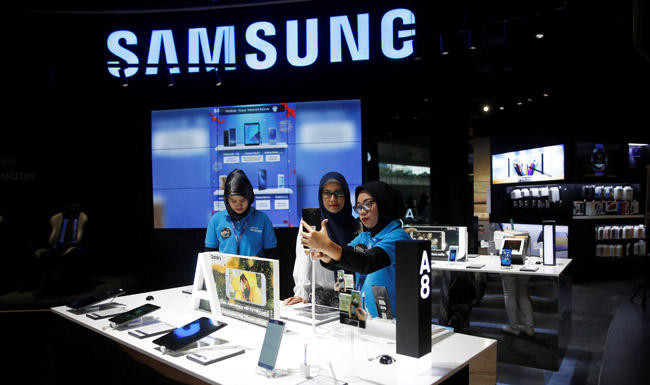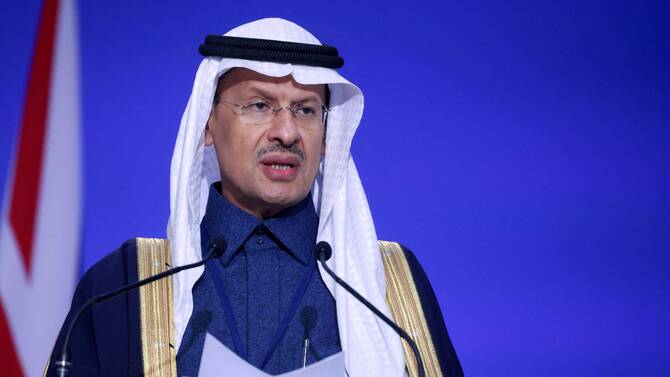SEOUL: Samsung Electronics Co. announced on Wednesday its first stock split and said it expects demand for semiconductors to remain strong in 2018, as it posted record annual profit driven by a so-called memory chip “super-cycle.”
The tech giant’s stock split is the latest in a series of moves to bolster shareholder returns, including 5.8 trillion won (SR2.04 billion) in annual dividends and 9.2 trillion won in share buybacks and cancelations in 2017.
The firm’s largesse has encouraged investors to hold shares despite concerns that the memory business may be peaking. The stock split will open the door to retail investors as well, boosting liquidity and underpinning valuations, analysts said.
“The stock split comes as a surprise to me,” said Kim Sung-soo, a fund manager at LS Asset Management who holds Samsung shares, noting that Samsung previously had shrugged off investors’ calls to split its shares.
“This will not have an impact on the company’s fundamentals, but it will increase supply of the stock and have a positive impact on shares.”
Led by a stellar fourth quarter, the global leader in televisions, memory chips and smartphones brought home an annual operating profit of 53.7 trillion won in 2017, outstripping the previous record of 36.8 trillion won in 2013.
While the profit was expected, the firm’s shares surged more than 8 percent after it unveiled the stock split. They closed up 0.2 percent.
In further good news for shareholders, Samsung eased concerns that the huge expansion in the global semiconductor business may be tapering off, saying the outlook for 2018 remained strong.
Chip makers like Samsung, South Korean rival SK Hynix Inc. and Intel Corp. have been riding a boom in sales of semiconductors as the world demands ever greater processing capacity to power data centers, high-tech smartphones and the blockchain ledgers behind cryptocurrencies.
“Looking at the mid-to-long term, Samsung expects the components business to see demand expand from new applications,” the company said in a statement.
Samsung’s operating profit for the three months ended December leapt 64 percent on year to 15.15 trillion won, in line with its forecasts.
The chip business was Samsung’s top earner last year, posting a record operating profit of 35.2 trillion won and more than doubling its profit on-year in the fourth quarter alone.
Samsung said it expected DRAM and NAND flash chip shipments to grow on-year by about 20 percent and 40 percent respectively in 2018.
The foundry business, which makes chips to order, would jump from 4th place to be a “strong market No. 2” behind Taiwan Semiconductor Manufacturing Co. (TSMC) in 2018, partly due to the cryptocurrency boom.
Cryptocurrencies are digital currencies that use encryption techniques for security and can be traded. The technology needs powerful chips to validate transactions.
Earlier this month TSMC said it expected the cryptocurrency market to drive up demand for high-end chips and help it post record revenue this year, outweighing softening sales to smartphone vendors.
Samsung’s mobile division, which competes with Apple, reported operating profit of 2.4 trillion won in the fourth quarter, down 3 percent from the previous corresponding quarter.
The launch of the Galaxy S9 flagship smartphone next month should minimize any off-season weakness in demand during the first quarter, the company said.
However, the outlook for Samsung’s smartphones was uncertain amid competition from Chinese rivals in markets like Europe and Asia, said Tom Kang, research director at data provider Counterpoint.
Samsung’s display business, which supplies Apple with OLED screens, reported a 1.4 trillion won profit in the fourth quarter, up 5 percent from the same period last year.
KwonYoung Choi, the vice president of Samsung’s display unit, brushed off reports that Apple will cut iPhone X production for the first three months of the year amid soft sales, saying the screen business was not dependent on any one client.
Samsung spent a record 43.4 trillion won in capital expenditure last year to boost production of memory chips and organic light-emitting diode (OLED) screens. As a result, capital expenditure would fall in 2018, it said.
Samsung unveils stock split as it reports record 2017 profit
Samsung unveils stock split as it reports record 2017 profit

The Family Office to host global investment summit in Saudi Arabia

RIYADH: The Family Office, one of the Gulf’s leading wealth management firms, will host its exclusive investment summit, “Investing Is a Sea,” from Jan. 29 to 31 on Shura Island along Saudi Arabia’s Red Sea coast.
The event comes as part of the Kingdom’s broader Vision 2030 initiative, reflecting efforts to position Saudi Arabia as a global hub for investment dialogue and strategic economic development.
The summit is designed to offer participants an immersive environment for exploring global investment trends and assessing emerging opportunities and challenges in a rapidly changing financial landscape.
Discussions will cover key themes including shifts in the global economy, the role of private markets in portfolio management, long-term investment strategies, and the transformative impact of artificial intelligence and advanced technologies on investment decision-making and risk management, according to a press release issued on Sunday.
Abdulmohsin Al-Omran, founder and CEO of The Family Office, will deliver the opening remarks, with keynote addresses from Saudi Energy Minister Prince Abdulaziz bin Salman and Prince Turki Al-Faisal, chairman of the King Faisal Center for Research and Islamic Studies.
The press release said the event reflects the firm’s commitment to institutional discipline, selective investment strategies, and long-term planning that anticipates economic cycles.
The summit will bring together prominent international and regional figures, including former UK Treasury Commercial Secretary Lord Jim O’Neill, Mohamed El-Erian, chairman of Gramercy Fund Management, Abdulrahman Al-Rashed, chairman of the editorial board at Al Arabiya, Lebanese Minister of Economy and Trade Dr. Amer Bisat, economist Nouriel Roubini of NYU Stern School of Business, Naim Yazbeck, president of Microsoft Middle East and Africa, John Pagano, CEO of Red Sea Global, Dr. Anne-Marie Imafidon, MBE, co-founder of Stemettes, SRMG CEO Jomana R. Alrashed and other leaders in finance, technology, and investment.
With offices in Bahrain, Dubai, Riyadh, and Kuwait, and through its Zurich-based sister company Petiole Asset Management AG with a presence in New York and Hong Kong, The Family Office has established a reputation for combining institutional rigor with innovative, long-term investment strategies.
The “Investing Is a Sea” summit underscores Saudi Arabia’s growing role as a global center for financial dialogue and strategic investment, reinforcing the Kingdom’s Vision 2030 objective of fostering economic diversification and sustainable development.












